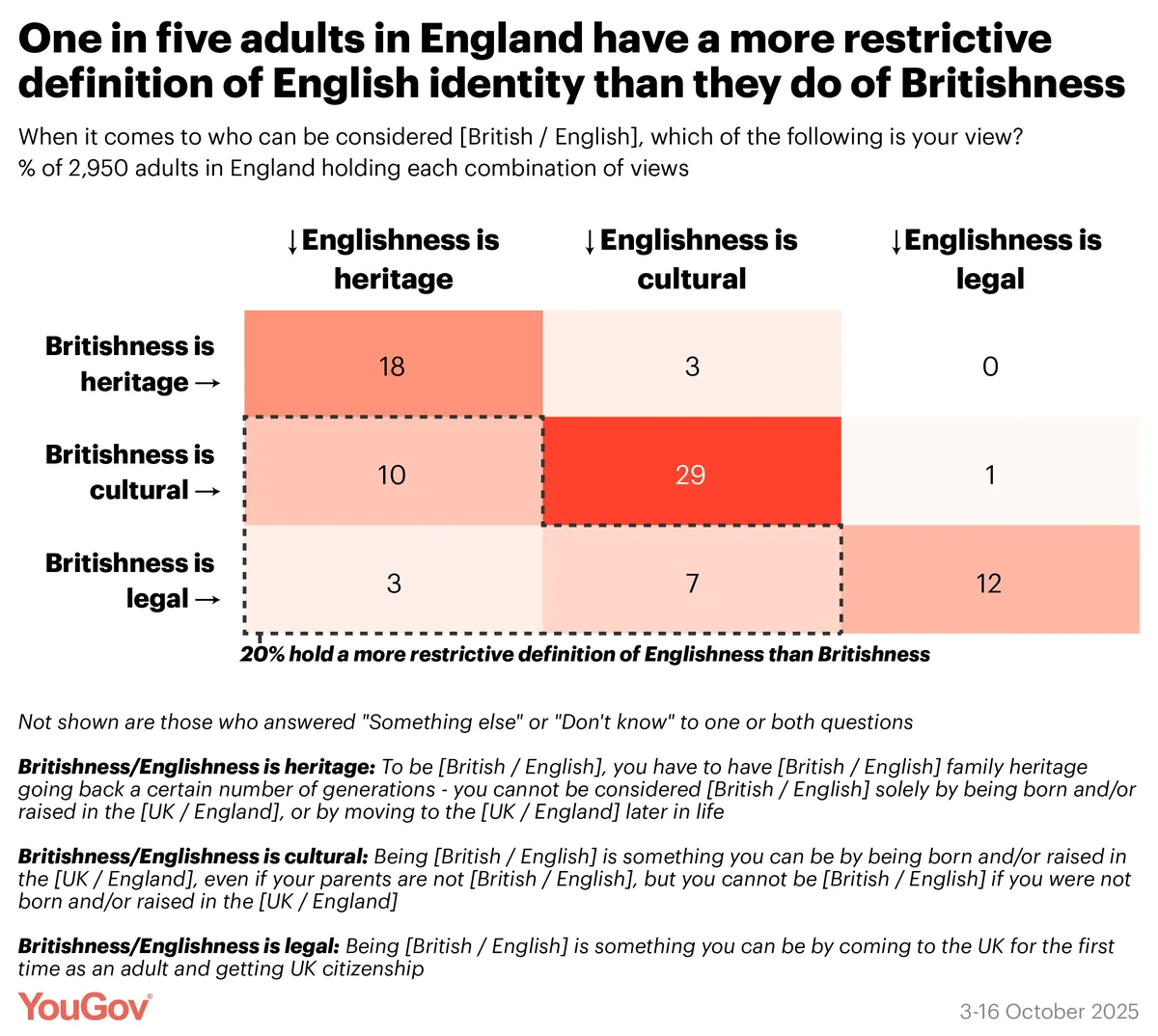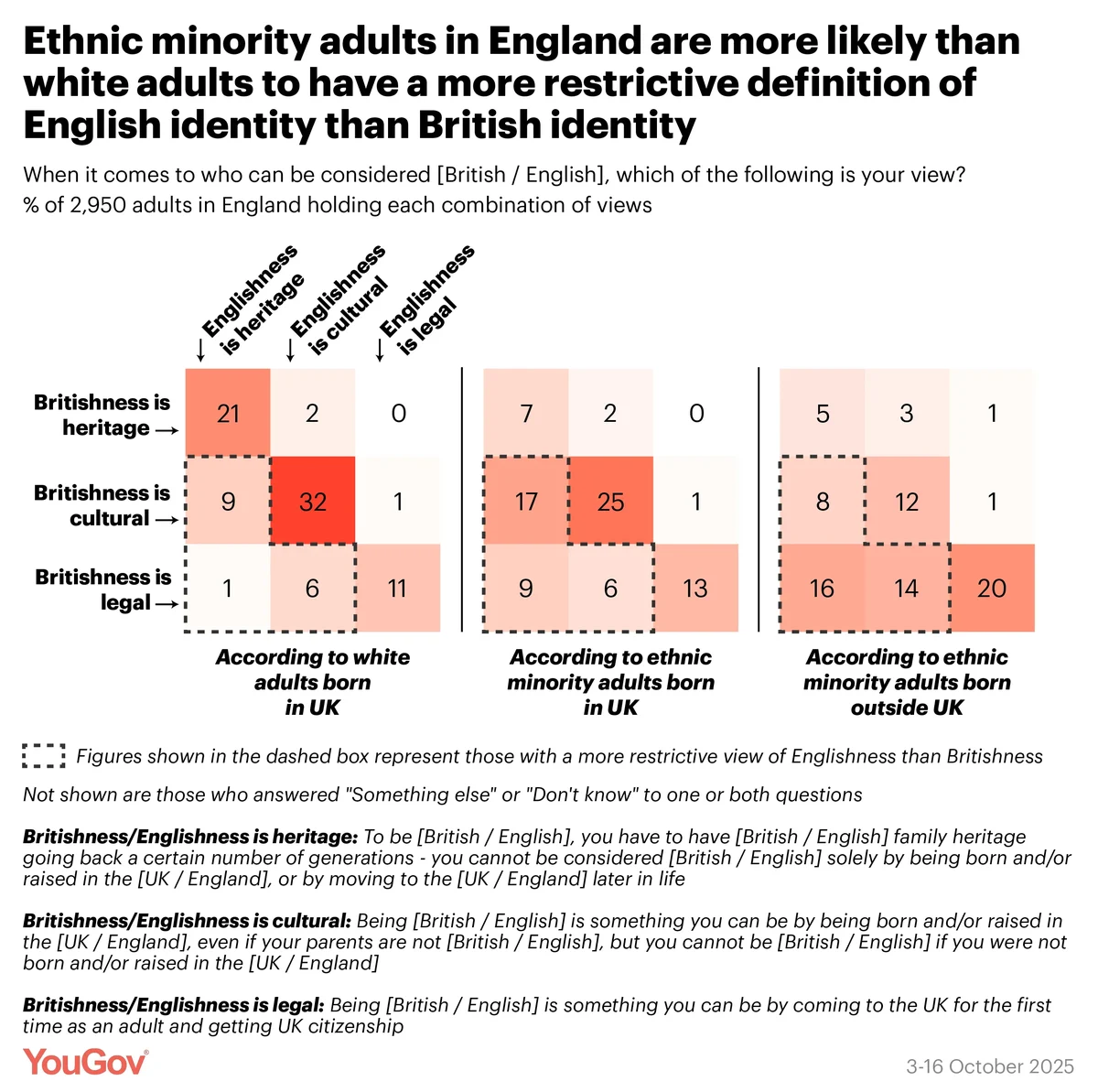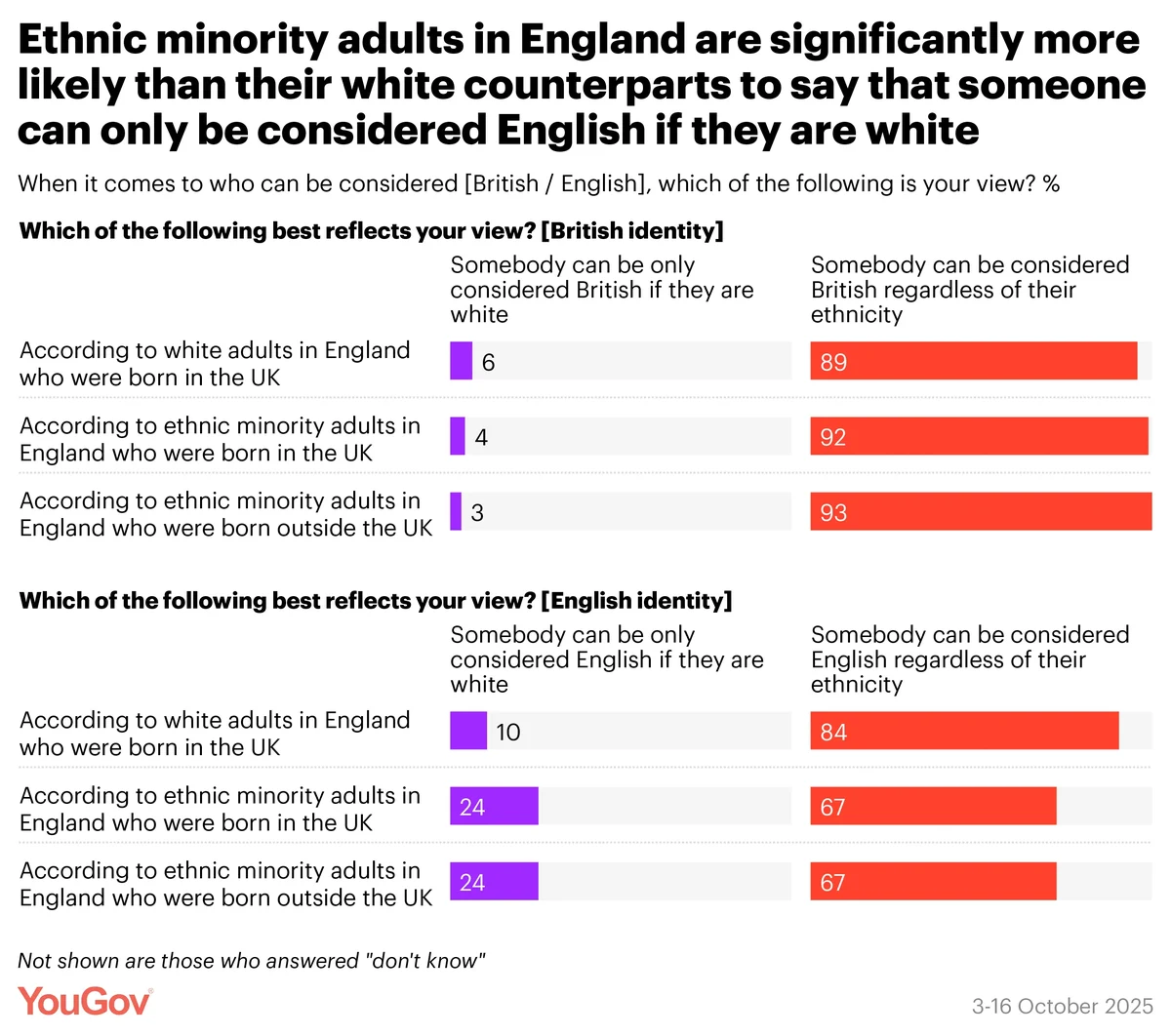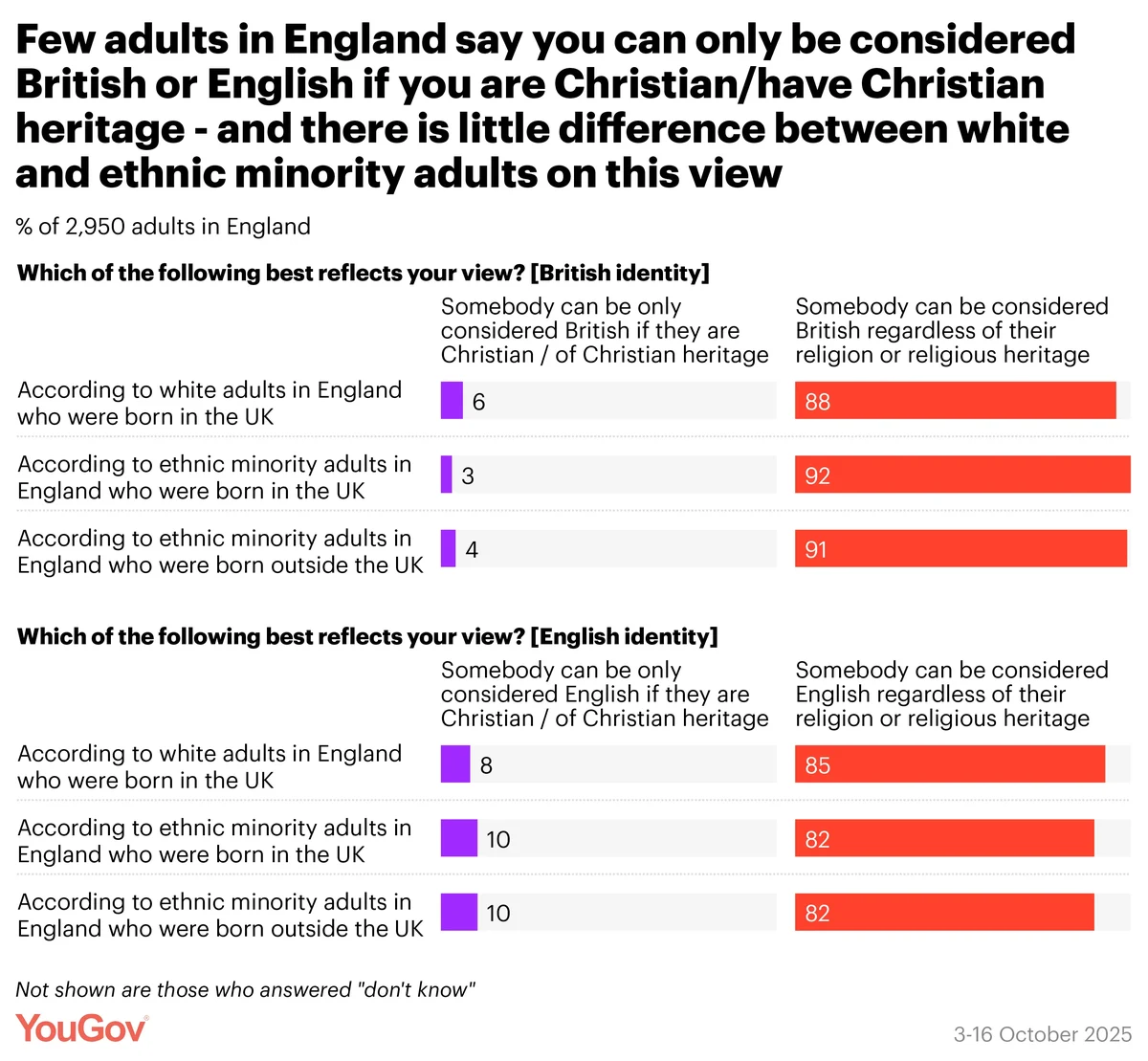A YouGov study examines how attitudes to British and English identity differ among white and ethnic minority adults in England
Key takeaways
- Ethnic minority adults in England who were born in the UK are much more likely than their white counterparts to say they feel a greater British than English identity
- The public are more likely to see English identity as requiring family heritage than British identity
- The public are most likely to say that the minimum requirement to be considered English or British is being born and/or raised here
- Ethnic minority adults are more likely than white adults to have a more restrictive definition of English identity than of British identity
- Only a minority believe you have to be white to be English, but ethnic minority adults are significantly more likely to think so than white adults
Back in February, former home secretary Suella Braverman penned a column in the Telegraph entitled “I will never be truly English”.
Braverman – who was born in Harrow to parents from the Indian diaspora (themselves born in Africa) – suggested that Englishness is ‘rooted in ancestry, heritage and ethnicity’, and that she does not feel English as she has “no generational ties to English soil, no ancestral stories tied to the towns or villages of this land”.
The Conservative MP instead claims for herself British identity, putting her in the 24% of ethnic minority adults in England and who were born in the UK that describe their identity as “British, not English”.
Indeed, feeling a greater sense of British than English identity is much more common among UK-born ethnic minority adults than their white counterparts. More than four in ten (43%) say they are either “British, not English” or “more British than English”, compared to 19% of white adults in England who were born in the UK. (For the sake of brevity, hereafter we refer to “white adults in England who were born in the UK” as “white adults” or “white adults in England”, as we are not examining the views of the much smaller group of white adults who are not born in the UK)
While 24% of white adults regard themselves as more on the English side of the spectrum than British, only half as many ethnic minority adults born in the UK say the same (10%). The most common view among white adults is that they are “equally English and British” (50%) compared to 29% of British-born ethnic minority adults.
Nevertheless, Braverman’s column proved controversial, with her former boss Rishi Sunak branding it “slightly ridiculous” in an interview for the BBC’s Political Thinking podcast.
But where does the public stand on English and British identity? A new YouGov survey set out to examine the view on the heritage argument, as well as how many people also believe race and religion are specific requirements of English or Britishness.
Are Britishness and Englishness based on family heritage, being born and raised, or on citizenship?
First, we asked respondents which of three descriptions come closer to their view on Englishness and Britishness: a heritage conception (that to be English/British you have to have family heritage going back a certain number of generations); a cultural conception (that to be English/British you have to have been born and/or raised here, but that you don’t need family heritage); or a legal conception (that being English/British is something you can become by coming to the UK for the first time as an adult and getting citizenship).
In both cases, the most common view is the cultural conception, with 40-41% holding it for either Englishness or Britishness.
However, the results show that people are notably more likely to hold the heritage conception of Englishness (32%) than they are of Britishness (21%). The reverse is true when it comes to the legal conception, which more people apply to British identity (24%) than to English identity (14%).
If we examine combined responses to this question, we see that most people (59%) give the same answer for both identities.
However, one in five English adults (20%) give a more restrictive definition of English identity than they do British identity (i.e. gave the heritage definition for Englishness while giving the cultural or legal definition for Britishness, or gave the cultural definition for Englishness while giving the legal definition for Britishness).

How do conceptions of British and English identity differ between white and ethnic minority adults?
The views of white adults in England closely reflect the overall public figures – unsurprising, given they make up the large bulk of the population.
Opinion among ethnic minority adults in England differs significantly, however, and is particularly affected by whether or not the respondent was born in the UK.
When it comes to British identity, ethnic minority adults in England are less likely to say this requires family heritage (9-10% versus 24% of white adults), with ethnic minority adults born outside the UK also much less likely to think it requires being born and raised in the UK (22% compared to 44-46% of UK-born white and ethnic minority adults).
Instead, ethnic minority adults are more likely than white adults to think British identity can be attained by coming to the UK as an adult and gaining citizenship. While 20% of white adults hold this view, this rises to 31% of ethnic minority adults born in the UK, and fully 56% of ethnic minority adults born outside the UK.
Differences are less dramatic when it comes to English identity. As many ethnic minority adults in England think that Englishness requires family heritage (31-33%) as white adults do (33%).
The cultural conception of English identity is held by fewer ethnic minority adults (30-35%) than white adults (42%), and the legal conception is held by more ethnic minority adults born outside the UK (22%) than white and ethnic minority adults born in the UK (12-15%).
When it comes to the combined figures, 16% of white adults in England have a more restrictive definition of English identity than of British identity, a figure which rises to 32% of ethnic minority adults in England who were born in the UK, and to 38% of ethnic minority adults born outside the UK.

Can you only be English if you are white?
Secondly, our survey also looked at how many people have a racial conception of Britishness and Englishness.
The results show that only 6% of adults in England believe someone can only be considered British if they are white, a figure which is largely similar between white and ethnic minority adults (3-6%).
More people say that you have to be white to be considered English (13%). While white adults themselves give this answer at about the same rate (10%), ethnic minority adults are significantly more likely to agree with this racial conception of Englishness, with 24% saying so.

Can you only be English if you are Christian?
Christian iconography featured prominently at the recent ‘Unite the Kingdom’ rally, with Sky News describing the march as having a uniquely “overt Christian nationalism”.
Some marchers bore crucifixes or flags with bible quotes, with chants of “Christ is King” and a public recital of the Lord’s Prayer. Such displays have drawn a rebuke from Christian leaders not to co-opt Christian symbols.
The results show that only 6% believe Britishness requires someone to be Christian or of Christian heritage*, with 9% saying so of Englishness. In both cases, the number of white and ethnic minority adults are about as likely as one another to see things this way.

It is also worth noting that whiteness and Christian heritage do not necessarily go hand in hand when it comes to English identity. Fewer than four in ten (38%) of those who think you have to be white to be English also think that you have to be Christian; 52% think religious status is not relevant to Englishness.
Those who think you have to be Christian do tend to think you also have to be white, although only a small majority say so (54%), with 43% saying that race does not matter.
How many people think you need to be white and have English family heritage in order to be considered English?
When we combine answers across these questions, we find that the overall percentage of adults in England who think that a person can only be considered English if they are white and have English family heritage is 11%.
Among white adults in England that figure is 9%, rising to 17% among ethnic minority adults from outside the UK, and 21% of ethnic minority adults who were born in the UK.
If we were to include the Christian/Christian heritage aspect as well, the proportion of the total population holding the full trio of these views is 4%, with little difference between white and ethnic minority respondents.
The broader point here is that while a third of white adults in England may have a conception of Englishness that is based on heritage grounds, the majority of them (64%) do not mean this in a racial sense – only a third (28%) do so.
By contrast, the majority of ethnic minority adults who hold the heritage conception of English identity do have racial connotations in mind when they say this (54-63%).
Attitudes to Britishness and Englishness by party
The primary difference between voters is between those who think Britishness and Englishness are contingent on family heritage and those who think anyone can gain these identities upon receiving British citizenship.
For example, while only 10% of 2024 Green voters in England think that English identity requires a family lineage from England, this increases to 19% of Labour and 21% of Lib Dem voters, to 47% of Tories, and 54% of Reform UK voters.
Similarly, 25% of Green voters think that a migrant can consider themselves English upon receiving UK citizenship as an adult, with 23% of Labour and 19% of Lib Dems saying the same, but only 6% of Tories and 4% of Reform UK voters.
By contrast, much more consistent numbers from each party say that Englishness is something you are from being born and raised in the UK, even without family heritage: 36% of Reform UK voters take this stance, as do 39% of Tories and 42-44% of Greens, Labour voters and Lib Dems.
Looking at the combined figure for Englishness requiring both family heritage AND being white, we see that 14-15% of Reform UK and Conservative voters hold this view, compared to 5-6% of Green, Labour and Lib Dem voters.
Again, these figures reduce further if we include Christianity or Christian heritage as a core component of Englishness, with the proportion of voters from each party saying this full trio is required standing at 8% of Reform voters, 6% of Tories and 0-2% of Greens, Labour and Lib Dem voters.
* ‘Christian or Christian heritage’ is our attempt to group together Christians and those who would culturally see themselves as descending from Christian tradition, but who would describe themselves as agnostic or atheist, to stand in contrast to those who are from another religion or religious heritage entirely, like Islam or Hinduism.
Interested in taking YouGov surveys? What do you think is required to be considered English and British, the issue of national identity in general, and everything else? Have your say, join the YouGov panel, and get paid to share your thoughts. Sign up here.
Interested in commissioning YouGov research? We connect in real-time with real people around the world to gather their thoughts, behaviours, and opinions, to ensure that our research data is powered by reality. Explore our survey services here.
Photo: Getty










